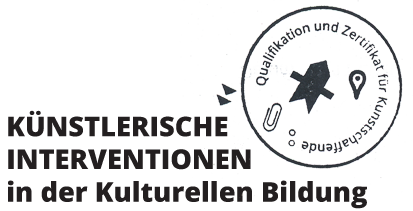

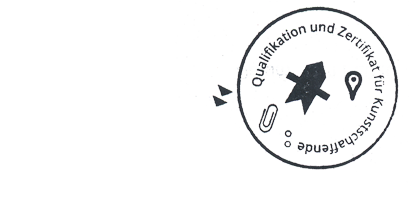
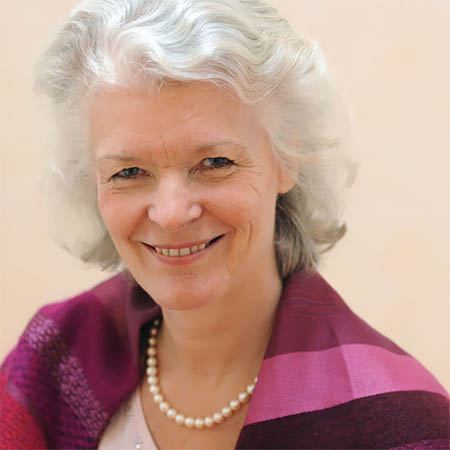
Ariane Berthoin Antal has conducted extensive research on artistic interventions in organisations in France, Germany, Spain and Sweden. This work built on her previous research on organizational learning, business and society, and cross-cultural communication. She is Emerita Senior Fellow of the WZB Berlin Social Science Center, Germany, Honorary Professor of the Technische Universität Berlin and Distinguished Research Professor at Audencia School of Management, Nantes. Besides hundreds of articles, her recent books include Learning Organizations. Extending the Field (with P. Meusburger & L. Suarsana, Springer 2014); Moments of Valuation (with M. Hutter & D. Stark, OUP, 2015) and Artistic Interventions in Organizations: Research, Theory and Practice (with U. Johannson-Sköldberg & J. Woodilla, Routledge, 2016).
Prof Dr Ariane Berthoin Antal: The Highs and Lows of Conducting Meaningful Research on Artistic Interventions in Organizations
A wide range of stakeholders are interested in the findings of research on artistic interventions in organisations. So our research can be meaningful, in the sense of being useful – to artists, employees, managers, policy-makers and other researchers, for example. The diversity of interests can also cause problems: will our work be misused by one or more of the stakeholders? Before addressing these issues, however, we first need to be clear about what would make the research meaningful to us. This workshop will enable participants to clarify their own research objectives relating to artistic interventions in organisations and how to achieve them while also recognizing the interests of other stakeholders for their work. The workshop is to address different research methods and will involve an “artful” approach to developing and communicating research ideas.
Meriam Bousselmi – Montaigne’s head and Aesop’s tongue
In the Essays, Montaigne asserted that we must make the difference between a well-made head and a well-filled head. This is where all the art of education lies. He indeed subjected the education of his time to virulent criticism, and rejected the education system that produces “donkeys loaded with books”.
Which raises the question of transmission and, more precisely, what has to be transmitted and how? Because according to Montaigne, knowledge according to Montaigne must make us not “more learned” but “better learned”. Isn’t that the whole unteachable lesson by Aesop’s tongue?
Welcome to our Reading and Storytelling Club!
For one hour, you will be invited to participate in acts of unlearning and relearning through questioning the power of literature and theatre as transmission tools of a unique and non-pedagogical knowledge. Together, we will explore the potential of making and sharing different stories about self and others in order to avoid what the Nigerian novelist Chimamanda Ngozi Adichie calls “the danger of a single story”. From fiction to self-fiction, each narrative redefines the boundaries of the world and opens us up to new perceptions of what we call reality.
In her original essay “The Tale-tellers”, the Canadian writer Nancy Huston postulates that human reality is fiction. To be human is to have a story and to tell stories. Fictions are not superfluous. They are a life force.
Each writing/reading of a book or interpretation/performing of a play constitutes an exercise of narrative construction. Consequently, it’s about negotiating freedom, plurality and the right to be different and to have another understanding /perspective on the same thing. The artistic experience is therefore more than an entertainment activity. It is a way of transforming experience into consciousness. It’s an empowerment tool that is able to provoke a self-reflective approach and mental shift. Far from a didactic method incompatible with the undisciplined spirit of art, artistic transmission can only be done on the basis of a dialectical approach.
Giving taste, inspiring and initiating someone to the poetry, beauty and complexity of the world is not a codified and easy task to do. What are the possible learning strategies in this case? Can we base learning on dialogue and collective improvisation?
Join us to find out together how we can extend the territories of imagination and resilience!
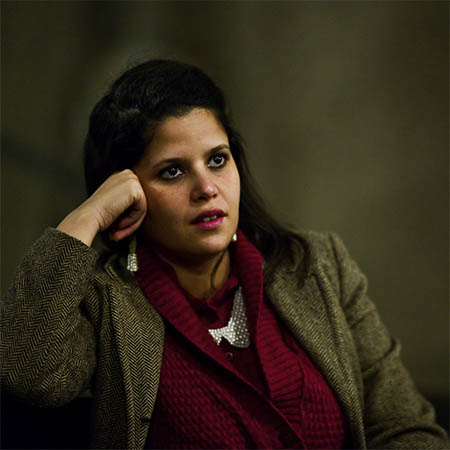
Meriam Bousselmi is a writer, theatre-maker, lawyer, researcher and lecturer. In her literature and theatre workshops, she seeks to wake up the participants to the power of art. In 2015, she directed the workshop “Act of Justice” in the frame of Junges DT Herbst camp. Also in 2015, she led the workshop “Weltwand auf Französisch” with a hundred pupils from three Frankfurt schools (Liebigschule, Zügenschule and Lycée français) as part of the German-French Day – Institut franco-allemand de science historiques and socials. In 2019, she took part in the artistic direction of the theatre project “Der Beat der Planeten” offered for 13 children and teenagers from migrant backgrounds in Weinheim. Her work focused on bringing the participants to reflect their own biographies and their perceptions of in/justice through the interpretation of “The Little Prince” story by Saint- Exupéry. In 2020, together with the artist Miriam Lemdjadi, she designed and led a Theatre workshop series on poetry and empowerment, “Nur eine Rose als Stütze”, in Heidelberg and Frankfurt in collaboration with the Freunde Arabischer Kunst und Kultur e.V. and The International Women’s Theatre Festival (IWTF). Based on an interpretation of Hilde Domin’s poetic work and biography, they opened a space of exchange between different generations of women and examined together the female (mis)-(re)-presentations of self, others, home and belonging using a mixture of storytelling and theatre techniques. In 2021, she held a lecture under the title: “The Mergoum Protocol: Typically Tunisian, (A)typically German? On Cross-Cultural Exchange” in the context of CAMP notes on education organised by Documenta fifteen’s Education and Art Mediation Department.
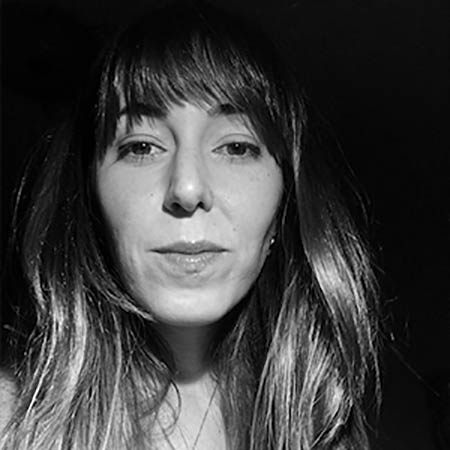
Renata Cervetto was born in Buenos Aires in 1985.She holds a degree in Art History (Universidad de Buenos Aires, 2011) and graduated from the curatorial programme at the Appel Arts Centre in Amsterdam (2013-2014). In 2014, she obtained the first Curatorial Fellowship granted by the Ammodo Foundation (NL), for which she researched artistic and curatorial practices in dialogue with pedagogy. This practical and theoretical work has been compiled in the book The Fellow Reader #1. On Boycotts, Censorship and Educational Practices (de Appel art centre, 2014). Between 2015 and 2018, she was Coordinator of the Education area of MALBA (Museo de Arte Latinoamericano de Buenos Aires). In 2016, she co-edited the publication Agítese antes de usar. Desplazamientos educativos, sociales y artísticos en América Latina, together with Miguel A. López (TEOR/éTica and MALBA. 2017). Between 2019 and 2020, she was curator of the 11th Berlin Biennale, The cracks begin within, together with Agustín Pérez Rubio, María Berríos and Lisette Lagnado. In March 2022, she was awarded one of MAR‘s research grants, where she investigates the dialogues developed during the last 15 years between Latin America and Spain around artistic-pedagogical practices. She currently lives and works in Madrid.
Renata Cervetto: Archives in art and education – what, how and for whom?
During this workshop we will reflect on art and education archives in museums, galleries and other cultural spaces. The lack of habit in generating these materials speaks of a particular situation around the work of art mediators and their lack of visibility within the institution. Some of the questions that revolve around this issue are: Why create an art and education archive? Who would be its potential users? How can we manage, from within and as part of our roles, an archive that accounts not only for the projects, but also for the effects that were involved in each of them? What limitations do we find in doing that? How can we account for the way in which we worked with the community or group? How can we fight the lack of writing in education departments? During the first part of the workshop, some examples of this type of archives will be shared in order to visualise their possibilities in response to different contexts (institutional, artistic, community or public space). The second part will consist of a collective exercise where participants are to be split into smaller groups to propose an archive for their personal working contexts.
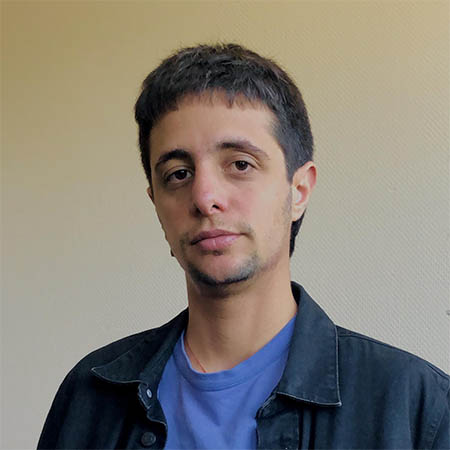
juca works with art, education and mediation. juca has installed two public works in Rio de Janeiro, Brasil. juca studied Architecture at UFRJ, BR, and has a degree in Drawing from Camberwell College, London, UK. juca worked in 2020/21 at the Museum of Modern Art in Rio coordinating the Childhoods and Activations nucleum in the education department. From 2017 to 2022 as a teacher at Parquinho Lage and member of the teaching council of the Parque Lage Visual Arts School, also in Rio de Janeiro, BR. juca worked with the creation, development, educational content and training with mediators at the Busão exhibition, in 2021 in Rio de Janeiro. juca has participated in four residencies, in education, at ART OMI, in Hudson, New York US, the artist residency ABERTA, at Centro Municipal de Artes Helio Oiticica, in Rio de Janeiro BR, Ninho, at Terra Afefé, Bahia BR and Demonstra, in Lisbon, PT. juca is a non-binary person and works with this thinking not only in relation to gender, but in the deconstruction of binary thought processes. juca’s favorite collaborations are with children. juca is a part if CAMP, at documenta fifteen. In august 2022, juca is developing POOL, an open call residency for art educators in Portugal.
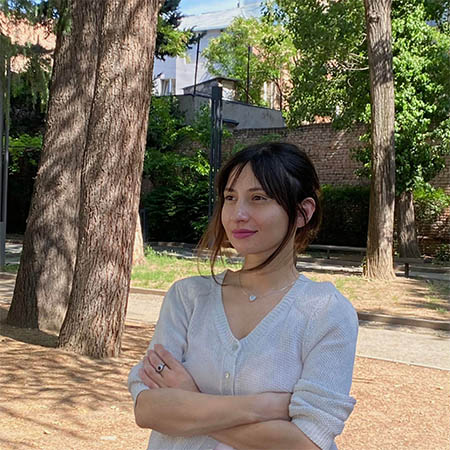
Mariam was born in 1992 and is a multimedia artist, actress and co-founder of the Georgian children theatre company Aitsona-Daitsona. After graduating with a BA in law from Georgian Technical University, she pursued a career as an artist and studied at the Centre of Contemporary Arts Tbilisi. She is currently doing her MA in graphic design at Tbilisi State Academy of Arts. Together with Mareike Wenzel and Lili Mamulashvili she founded the NGO and children theatre company Aitsona-Daitsona. She acts in all Aitsona-Daitsona’s plays, works as project manager and runs and devises workshops for children and teachers. Outside her work with Aitsona-Daitsona, Mariam is a professional artist. She works in various mediums of art, mostly in fine art, design and performance, and her works have been shown in solo and group exhibitions. She is also a member and co-founder of the feminist art collective “Gorgonas”.

Lili, born in 1992, is one of the co-founders of Aitsona-Daitsona, for which she works as an actress and educational programme manager. She is a cultural educator and has acquired a Bachelor’s degree in Psychology and a Master’s degree in Sociology of Culture and Media. She studies the representations of femininity in pop music. Lili acts in all of Aitsona-Daitsona’s plays and runs workshops for teacher and children. As Aitsona-Daitsona’s educational programme manager, she coordinates activities with schools and cultural centres and is part of the team devising the workshops. Lili also works as a journalist writing on feminism and pop culture. She has been hosting the feminist podcast “Femstream” together with the Boell Foundation and the Women’s Fund in Georgia.
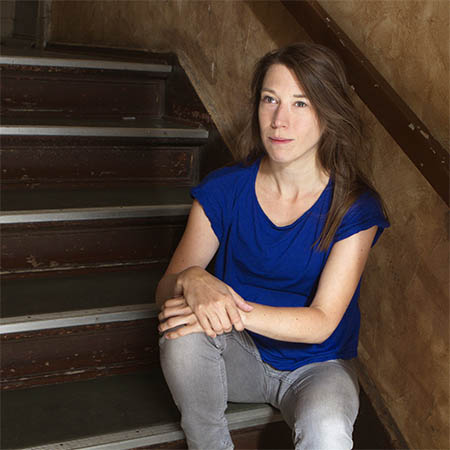
Mareike, born in 1978, is an actress and theatre-maker and graduated with a BA(Hons) in Acting from Birmingham School of Acting in 2004. She has been a member of the performance company SIGNA since 2007 and has performed at various theatres and festivals all over Europe. In 2017, she founded the Georgian NGO and children’s theatre Aitsona-Daitsona together with Mariam Gabritchidze and Lili Mamulashvili with the aim to bring modern, emancipatory children’s theatre especially to the regions of Georgia. Mareike is Aitsona-Daitsona’s artistic director has directed all of Aitsona-Daitsona’s plays, and together with the team, she created the educational programme and runs theatre workshops for children and teachers.
Mareike’s focus is on narrative spaces and immersive performances. Her own performances have been invited to Tbilisi Triennial, Gallery Nectar Tbilisi, FLARE 15 Festival and others. She ran theatre workshops for organisations such as the Women’s Initiative Supporting Group Tbilisi, the Boell Foundation and Goethe Institute Georgia, DVV International and Civic Education Teacher’s Forum. She is currently a fellow at “Artistic Interventions in Cultural Education” of Hildesheim University.
AITSONA-DAITSONA: Creating Communal Stages – A workshop based on Aitsona-Daitsona’s theatre work with teachers and children in Georgia
AITSONA-DAITSONA is Georgia’s first emancipatory touring theatre for children and was founded by the artists and theatremakers Mareike Wenzel, Mariam Gabritchidze, Lily Mamulashvili and Natia Kavtaradze in 2017. Our aim is to establish and promote new emancipatory theatre for children and young people in Georgia as well as to create an inclusive and participatory platform for theatre and arts in education that reaches beyond the cities and into the Georgian regions. We see theatre as a powerful tool for change, empowerment and education, and as a social event, bringing people together and creating solidarity.
AITSONA-DAITSONA’s mission “A Stage For Everyone” is to make theatre and culture accessible to all and also to include all in creating theatre and art. We are working with children and young people horizontally, including them in decision-making processes and working with them, and not just for them. We take their ideas, problems and interests seriously, and try to find creative ways of discussing them together on stage and beyond. We want to reach and include children and young people who normally don’t have access to many cultural events and theatre performances, hence our special focus on the regions.
We not only perform plays, we also run theatre workshops for children and young people as well as for teachers. Our training programme for teachers offers a toolkit of inclusive theatre methods that can be used in different classes promoting creative, holistic and inclusive learning and teaching methods. In these workshops we give teachers different tools to include creative methods in classrooms and also devise own work with children. Together with the teachers, we try to rethink classical teaching and classroom structures, give space to unlearn them and develop new methods together.
After an introduction of our company, in our workshop at the Symposium, we will discuss our work and artistic approaches, and we will look more closely at different methods of participation and inclusion, and also at the pitfalls that this work bears. We will discuss the importance of the inclusion of teachers in our work and share our methods and strategies. There often is a notion in arts education that teachers are rather seen as an obstacle then allies when working as artists at schools. We want to challenge this view and discuss the importance of becoming allies with teachers and also working horizontally together with them towards new holistic forms of education.
In the first part of the workshop, we will give an overview of the different fields of our work and set the frame. In the second part, we will look at concrete exercises, work processes, methods and examples of our work and discuss the questions: Who are our allies? Where do we set the focus? Where to start and how to initiate participatory processes? Where are the limits? What are the different roles we have to take on? How to create an open and safe space?
The workshop will have a practical part in which the participants have the possibility to explore these questions in different exercises. We want to create a space to explore and exchange experiences together and create new visions for cultural education.
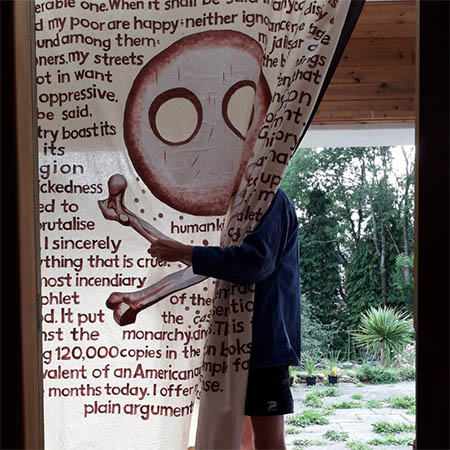
David Garner was born in Ebbw Vale, South Wales. He is an installation artist known for his use of found objects and overtly political themes. He studied at Newport and Cardiff College of Art and the Royal College, London where he received a scholarship to work in the RCA studio in Paris. Subsequently he returned to South Wales, with a desire to root his artistic practice there. He is one of Wales’ leading visual artists, having exhibited work alongside Louise Bourgeois, Jenny Holzer, Bill Viola and Mark Wallinger. In 2015, the National Museum & Galleries of Wales purchased Last Punch of the Clock for its contemporary collection. Garner became a successful recipient of the ACW Creative Wales Award, allowing him to broaden the medium in which he works, through exploring the possibilities of time-based media and their potential outcomes for his future work. As a result of this award, Garner staged Call and Response, an installation comprising a chandelier at the Chartist Cave, Trefil, Mynydd Llangynidr, and an improvised response from harp player Rhodri Davies, on the 20th August 2015. Garner was included in Tomorrow Today at ‘Created by Vienna’ 2015, a city festival of contemporary art which reflected on the interface between art and capital. He was shortlisted for Cymru yn Fenis Wales in the Venice 2019 Biennale di Venezia 58th International Art.
David Garner – Socially Engaged Art from A to B
I intend to discuss two artworks that required the involvement of public intervention as part of their outcomes. A is for Aberfan is an installation referencing the Aberfan disaster, where the catastrophic collapse of a colliery spoil tip engulfed a primary school, and B for Defiance is an exact replication of the ‘Arbeit Macht Frei’ sign above the gates of Auschwitz. The inverted B in the word ARBEIT symbolises an act of defiance.
I want to give an insight into my working practice, materials, methods and the importance of public involvement and intervention to arrive at a conclusion.
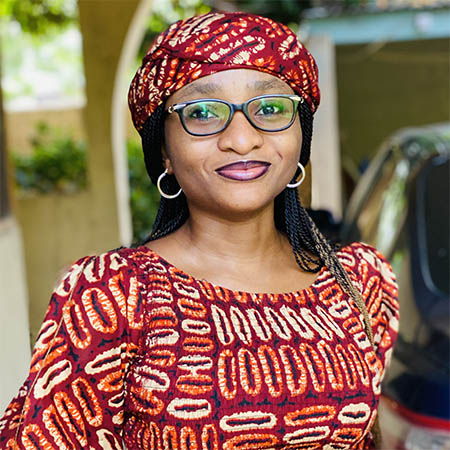
Dr Naomi Andrew Haruna holds a PhD in Cultural Sustainability from University of Maiduguri, an MA degree in Advertising and Marketing from Coventry University UK and a Bachelor’s degree in Creative Arts with a specialisation in Graphics from the University of Maiduguri. Her research interests include Peace Media, Cultural Sustainability, Development Communication and Gender Studies. Naomi is currently a Lecturer with the University of Maiduguri, Nigeria and also Coordinates the SDG Graduate School, “Performing Sustainability, Cultures and Development in West Africa”.
Dr. Naomi A. Haruna: Effectiveness of Artistic Interventions in educational and social contexts within an insurgency environment – A case of Internally Displaced Persons in some selected camps
Over the past decade, the insurgent group known as “Boko Haram” has consistently captured and exploited the people of Borno State, in Nigeria. One of the salient effects of Boko Haram’s activities is forced migration and displacement, which has set back the region decades in development, especially in terms of education and social interactions amongst the people of Maiduguri. Non-Governmental Organisations and the Government have invested a lot of effort and different strategies in advocating for social inclusion and cohesion within communities, especially among Internally Displaced Persons (IDPs) living within camps. There have been advocacies towards an inclusive and holistic approach in implementing developmental processes by revisiting the strength of media and artistic activities. This study uses positively reinforced visual illustrations for the purpose of promoting social inclusion amongst the IDPs and promoting retention in early learners among IDPs of all ages. Bearing in mind that a picture is posed idiomatically to be better than a thousand words, pictures are not only more effortless to recognise and process than words, but are also easier to recall especially during learning process (Devan, 2015). Two examples will be discussed which are centred around the use for artistic approaches for early child education and awareness creation on the importance of social cohesion and integration using an arts-based bottom-up approach. The IDPs participate in designing visual materials that will be used in sensitising the community and thus creating a suitable atmosphere for effective communication and discussion of issues that affect them. Using existing and documented data, the study identifies the peculiar challenges and conditions experienced by IDPs while living in camps and host communities, how they affect their survival strategies, rehabilitation processes and integration processes, and how the visuals designed can be used to advocate for a free, fair and egalitarian society.
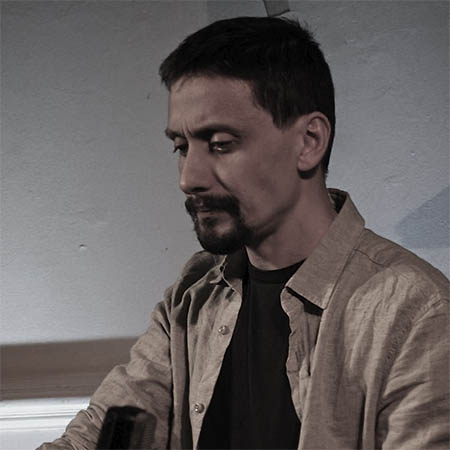
Jan is a performer, composer, researcher and educator. His research examines epistemic models adopted in creative practice. This has entailed the development of hybrid and transcultural approaches to practice and education as well as knowledge production and research.
He is both trained as a western Classical flute player and has studied several other flute traditions, including Turkish Ney, Chinese Xiao and Dizi as well as Rajasthani Satara and Alghoza. He teaches Turkish Ney at the Yunus Emre Institute in London as well as in private classes.
He works both as a contemporary artist and musician, receiving commissions for concert performance, installation works and contemporary dance scores, and as a performer and recording artist. He has performed with artists from electronic and freely improvised music, such as Mark Fell, Rian Treanor and David Toop, as well as featuring regularly as a soloist on traditional instruments for major film scores.
Jan teaches socially-engaged practice and practice-based research at the Guildhall School of Music & Drama and has also led creative projects for in communities around the world including Gambia, Thailand, Germany and Gaza and the West Bank.
He is experienced in facilitating conversations and interviews and has chaired discussions with the musicologist Georgina Born and artists Mark Fell, Michael Gordon and CC Hennix, amongst others. He has recently been invited to present his work at Simon Fraser University in Vancouver, ZKM in Karlsruhe as well as Trinity Laban in London.
Jan Hendrickse: Flute making workshop: Exploring intra-action through sound making
This session will combine practical experience and discussion. We will be spending time making a simple flute together; no previous experience is required. We will be discovering how we can use sound-making and listening as a way create connections with other people and with environments. Participants will be engaging in the activity as well as reflecting upon the process. In this way we will also be discussing modes of facilitation and decision-making. Through practical experience, we will explore the application of different modes of facilitation, and how to design open creative processes. The session will be relevant for those working in any medium. No musical experience is required.
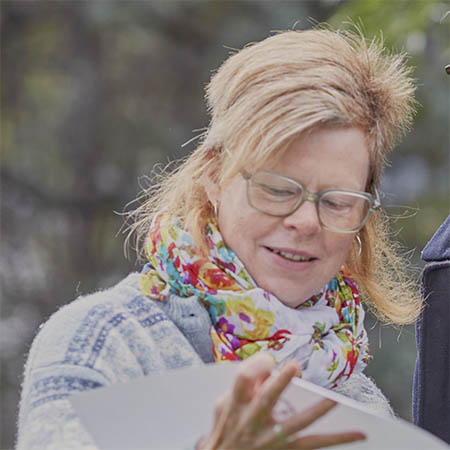
Anne Helga Henning, born in 1968, lives and works as a visual artist in Trondheim, Norway. She was educated at The Academy of Fine Arts in Trondheim, and has a relevant further educational course as an atelierista from the Reggio Emilia institute in Stockholm, Sweden. This course brought forth her interest in collaboration through artistic interventions with various institutions such as kindergartens, schools and institutions addressing psychiatry, dementia care and, lately, refugees.
Henning’s research on how to create abstract visual compositions with people with dementia (Mønster, 2015) has received national attention. Through her collaboration with Svartlamon Kindergarten over the years 2007 -2017, the kindergarten won a national kindergarten award three times. In the years 2016-2021, Henning was involved in three public art assignments for schools and nursing homes, based on the participation of students and residents. In all these assignments, participation and meeting through artistic interventions with research groups over time has been important. This co -research consolidates a platform for the finalising process in her artist’s studio preparing for the final public artwork. Henning also employed a 50 per cent post associate professor in drawing at the Faculty of Architecture and Design, The Norwegian University of Science and Technology.
Anne Helga Henning: Worldmaking through ornamenting
In my practice I want the participants to experience making a tactile and visual ornament together working in silence. The ornament will relate to natural found objects of the world that are composed on the table where the ornament-making will take place. During the session the participants will relate actively to the other participants moves in making the ornament in a different way than if they were able to speak with each other. So another way of “listening” and “speaking” to each other is required.
As no person will have a leading hand on the outcome of the ornament and how it relates to the objects will be unpredictable and open-ended. Which creates an interesting platform for discussing experiences that came up during the session. Assosiations, memories and fantasies that were triggered both as we moved along and as a response to the final visual outcome.
We will set off time to reflect and discuss all this.
After the performance workshop I will show a short movie called “We need a ladder!”
The movie is allso about listening closely to situations. I will show how I used my competence as an artist and atelierista to prepare for the group of co-researchers next step, which is always interesting and in many ways risky. In this case the group consisted of 3-year-old children exploring a specific architectural environment in my hometown.

Marie-Therése Holzer works at the department “Bildung und Diskurse” at the Goethe-Institut in Munich, with a focus on projects of cultural education and civil society. She studied German studies, history and media culture studies at Ludwig-Maximilians-Universität.
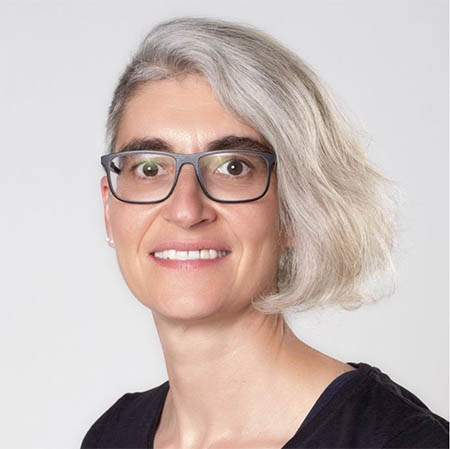
Having completed her training as a bookseller with Süddeutsche Verlagsgesellschaft in Ulm/Donau, Stefanie Kastner studied library administration at the Hochschule für Bibliothek und Information in Stuttgart. Having headed the Public Library in Stadtlohn in Westphalia, she started working as a local staff member for the Goethe-Institut in Rotterdam. Afterwards, she was seconded head of the Information Departments in Algeria and Côte d’Ivoire before she became information and library head in Sao Paulo for the South American region. During this period, she acquired a Master of Media Research degree at the Hochschule der Medien in Stuttgart. Recently, Stefanie Kastner was responsible for the Region of Sub-Saharan Africa as head of information with a regional assignment (LIR) to Johannesburg. Her focal areas are the fields of Digital Literacy, Gaming, Metaverse, Cultural and Creative Economics and Promoting Reading.
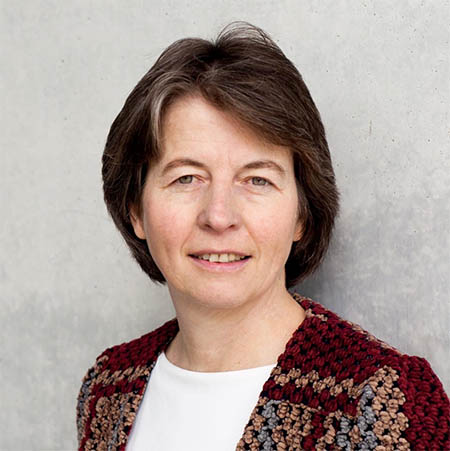
Dr Katharina L. Ochse is responsible for Youth Education, including Cultural Education, at the Languages Department of the Goethe-Institut headquarters. She did her doctorate at Freie Universität Berlin (Cornell-University, Ithaca, NY.) and subsequently obtained a Master’s degree in school management and a Master’s degree in mediation ab. Until 2020, she headed the Goethe-Institut Montevideo. She had previously worked in the international culture and education field at the Deutsche Welle Akademie (for the Middle East/North Africa area), the Foreign Office (Cultural Affairs Department), the German Academic Exchange Service (Poland, Bosnia-Herzegovina, Bonn), the United Nations (Kosovo), Gesellschaft für Internationale Zusammenarbeit (GIZ), the Wissenschaftskolleg Berlin (for Bulgaria and Romania), the Freie Universität and Humboldt University Berlin.
Goethe-Institut Germany: Artistic work in social and educational contexts – national and regional projects and approaches of the Goethe-Institut
Artistic work in social and educational contexts: national and regional projects and approaches of the Goethe-Institut
Cultural education plays an important role in the work of all departments of the Goethe-Institut around the globe. Artistic projects within the areas of music, theatre, video, literature and other arts always take into account local traditions into account in the activities of the departments.
This presentation focuses on
a) artistic interventions within the context of German language acquisition mainly addressing youth at school in different countries
b) the use of art in cultural and political education projects in Germany as a new structure inside the Goethe-Institut for international cultural exchange
c) the support of artists in the mentorship project Hub@Goethe in Johannesburg and the embedding of artist in the project “Let’s Game Jam Art”, which is situated on VR Chat and connects artists and coders.
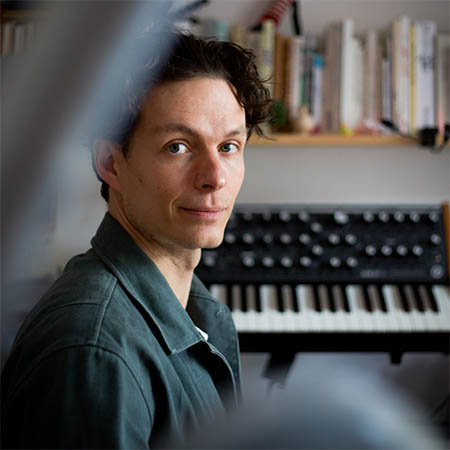
Anton Kats (r. 1983 Kherson, Ukraine) is an artist, musician and dancer who is currently based on Earth. Anton’s practice derives from informal everyday relationships within a vibrant neighbourhood in Kherson, Ukraine, and is complemented through the necessity and pragmatics of self-legalisation in Europe via entering formal institutions of education. After attending Master’s programmes in Art in Context at the University of Arts Berlin and Interactive Media: Critical Theory and Practice at Goldsmiths College, University of London, Kats finalised his studies through a practice-based PhD at Goldsmiths. In 2016, Kats was invited to join the aneducation team of documenta14 as an artist, where he initiated the Narrowcast House and the A-Letheia projects. Kats is a lecturer and educator with experience in developing experimental academic curricula with the Weissensee School of Art, Berlin, and was a lecturer of Contextual Studies at Ravensbourne University in London and a guest lecturer at the New York University and Goldsmiths University of London. His works have been exhibited and performed in venues including the SAVVY Contemporary, Serpentine Galleries, Tate Modern, Tate Britain, Victoria and Albert Museum, the Showroom Gallery, Bergen Kunsthall, Kochi Muziris Biennale, Haus der Kulturen der Welt and the documenta 14 in Athens and Kassel, among others.
Dr Anton Kats: RA:DIO – All kinds of fires
The workshop facilitated by Anton Kats is shaped by the fundamental questions of transmission:
Driven by the questions of agency the workshop will consider radio as a medium of emergency reaching beyond a particular technological form. Exploring radio as a working social power expressing conditions of politics, culture and heart, the workshop will practically investigate trajectories of artistic practice in times of great intensity, conflicts and war.
The practitioners are invited to form an ensemble investigating listening as an overarching methodology of work. Invoking listening as a sonic strategy altering one’s own practice and uncertainty into a readable place, the workshop will draw on scientific methods of artistic research, performance, dance, music, improvisation, theatre, mediation and film in order to make these useful in the everyday context of artistic and agency-driven work.

Sociologist and musicologist Professor Dr Susanne Keuchel is Director of the “Akademie der Kulturellen Bildung des Bundes und des Landes e. V.” and Chair of the German Federation for Arts Education and Cultural Learning, reg. Ass. (BKJ). Between 1993 and 2013, she worked at the Centre for Cultural Research in Bonn, initially as a scholar, and from 2009 on as Managing Director.
In addition to empirical cultural research, her chief areas of activity are the application of new technologies in the field of culture, Cultural Education and diversity. Her responsibilities have included surveys for the 1st and 2nd Youth Cultural Barometer, for the Cultural Barometer 50+ and for the “InterKulturBarometer” (intercultural barometer). Furthermore, she is Honorary Professor at the University of Hildesheim’s Institute for Cultural Policy and lecturer at the “Hochschule für Musik und Theater” in Hamburg and is active in committees of social policy institutions.
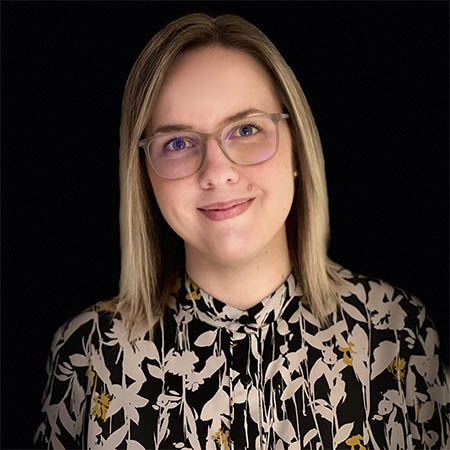
Tiina Kukkonen is a Finnish-Canadian visual artist, arts educator, and researcher. Through her work with organisations such as the Canadian Network for Arts and Learning and the English Language Arts Network, she has been involved with numerous research and advocacy initiatives aimed at increasing arts education awareness, appreciation and access. Her own doctoral research investigated the role of intermediaries in supporting arts education in rural and remote communities in Canada.
As an arts educator, Tiina has taught visual arts in K-12, university and community-based settings. She holds a Ph.D. in Education from Queen’s University, where she currently teaches visual arts education to aspiring educators. Tiina is also a member of the Kingston Fibre Artists and serves on the executive committee of the Canadian Society for Education through Art.
Dr Tiina Kukkonen- Envisioning the Future of Artistic Interventions: From Research to Action
Artistic interventions require different types of supports and resources to ensure their success within educational and social contexts, such as adequate funding, strong leadership and community involvement. Assembling and developing such supports over time can be a challenge for those involved in the interventions (e.g. artists, schools, communities, organisations). In some cases, the partnerships formed between various supporting entities collapse and/or the necessary resources cannot be found, causing the artistic interventions to fizzle out.
In this participatory session, we will discuss strategies and visions for the sustainability of artistic interventions within educational and social contexts from the perspective of different stakeholder groups. We will draw on research and calls to action from Canada and around the world to inform our discussion and inspire future action.
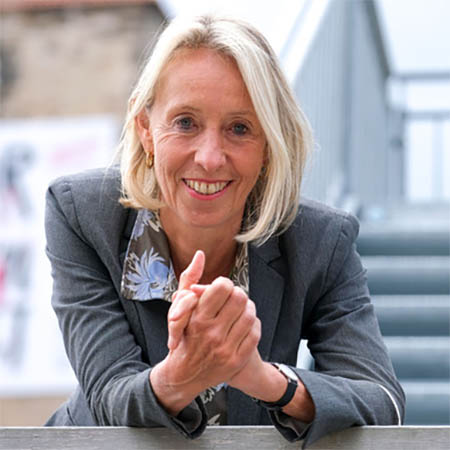
Professor Dr habil Birgit Mandel is Professor for Cultural Management, Arts Education and Cultural Policy at Hildesheim University and head of MA programme Arts Mediation. She is Vice-president of the German Society for Cultural Policy (Kulturpolitische Gesellschaft), founding member and former president of the Association of Cultural Management at universities in Germany, Austria and Switzerland (Fachverband für Kulturmanagement in Forschung und Lehre), board member for the Berlin Arts and Festival Management board (Kulturprojekte GmbH) and board member of the Commerzbank Foundation Frankfurt a. M.
She did several research projects in the field of cultural participation, connecting cultural policy, arts education and mediation, audience development, and visitor and non-visitor studies for the arts. She is author of various publications on arts/cultural management and mediation.

Verena Melgarejo Weinandt, born in 1986, is a German-Bolivian artist, curator, educator and researcher who intertwines her different fields of work. Artistically, she works with video-and photo-performances and installations, which often include textile elements. Her artistic works have been exhibited at the Museo de Arte Contemporaneo Salta/Argentina, at the nGbk Berlin/Germany, at the Wiener Festwochen Art Festival in Austria, and at the Biennial Sur Colombia and Argentina. She currently works at Central European University for the artistic-research project REPATRIATES. She has been teaching courses at the HzT-UdK Berlin, the Academy of Fine Arts Vienna and Berlin Weißensee.
Verena Melgarejo-Weinandt – Centering Artistic Mediation from a curatorial point of view: “Gloria E. Anzaldúa as method in decolonial art, art education and politics”
In my participative lecture I would like to present my educational work around the work of the decolonial and feminist pioneer Gloria E. Anzaldúa* and specifically her book „Borderlands/ La Frontera: The New Mestiza“ which I am translating together with the translation collective Chaka into German. Over the span of the last 7 years I was able to expand this translation practice into several formats, but the educational work with many other artists has been a major focus of this process and many workshops have been a site of Un/learing with and through Anzaldúas Methodology of Knowledge Production. I would like to present and discuss several concrete examples of these workshops and exchange on our knowledge/ experiences of un/learning though artistic practices following these questions:
Why is artistic educational (translation) work around Anzaldúa politically and spiritually relevant and necessary? How have marginalised voices and positions received Anzaldúa and fought for her dissemination in the German-speaking countries? Anzaldúa‘s knowledge production is based on knowledge that is based on lived experience, that arises in and from the chicana community, knowledge that is not institutionally anchored. What knowledge can be visible and localized locally with the help of Anzaldúa’s “tools”? How can we build bridges from Anzaldúa to other knowledge and positions?
*GLORIA E. ANZALDÚA (1942 – 2004) was a self-proclaimed “Chicana, tejana, from the working class, dyke-feminist poet, author-theorist”. Her book Borderlands/La Frontera shifts and complicates the concept of what is considered a border. Based on the history of the Mexican-American border, a geographical definition is expanded and presented not only as a violent but also as a potentially transforming space within which opposites, differences and paradoxes coexist, collide and enable change. Her work inspires artists, authors, researchers and activists through many generations. Her groundbreaking work is an important reference for people working with decolonial feminism(s), intersectional Queer Theory and Movements and indigenous Spirituality. Anzaldúa is one of the most important voices of the Chicanx Movement in the USA.

Katarzyna Niziołek is holder of a PhD title in sociology and assistant professor at the Institute of Sociology, the University of Białystok, Poland, as well as being a researcher into social art, theatre participation and the performative aspects of collective memory. She is author of numerous publications and conference presentations on those topics. Since 2005, she has worked on a non-profit basis for the University of Białytok Foundation (from 2008 to 2019 as President of the organisation, currently as Vice-president). She is the initiator and leader of the Social Art Workshop, a collective dedicated to combining social research with artistic practices and civic engagement. Within that framework, she has curated and produced participatory theatre projects, including: “The Method of National Constellations” (2014-2016), “Prayer. A Common Theatre” (2016-2017), “Bieżenki” (2018), “Living Torpedoes” (2019) and “The Suitcase” (2021). She also teaches socio-artistic workshops to students, researchers, educators and arts practitioners. Since 2016, she has been responsible for the programme of the University Cultural Centre.
Katarzyna Niziołek: Participatory Theatre and Social Research
“Participation” and “social impact” seem to be the catchphrases of the day when it comes to art, and social research as well. While participatory action research has already become a well-established practice in the world of qualitative methods in sociology, the so-called “social turn” has placed the arts closer to sociological concepts and methodology as a means of not only interpreting art, but also constructing artworks. These changes are opening new pathways for both sociologists and artists interested in working together and exploring the “in-between” areas of art, science and social involvement. One such niche is being occupied by participatory theatre – a wide array of diverse and largely innovative practices that create conducive contexts not only for interdisciplinary collaborations, but also for citizen participation.
As an academic sociologist, I have been exploring this area of theatrical production for almost a decade now, working in collaboration with playwrights and directors, observing the practice from the inside, looking for possibilities of exchange between participatory theatre and research. Hence, the lecture will focus on the projects we have developed together: “The Method of National Constellations” (2014–2016), “Prayer. A Common Theatre” (2016–2017), “Bieżenki” (2018), “Living Torpedoes” (2019) and “The Suitcase” (2021).
Using these participatory theatrical projects as examples, I intend to provide an empirically grounded and self-reflective insight into three distinct and at least to some extent original methodologies of direct audience/public engagement. Each of these can be referred to as a different role of the participant that one performs in the process: a protagonist (or content provider), a user (directed or animated by the artist in a theatrically constructed situation) or a co-creator of the theatrical piece (enjoying a certain degree of agency and autonomy).
The lecture will be completed with some notes on the possible research and social uses that such practices – via embodiment, empathy, imagination, and understanding, to mention but a few distinctive qualities – may effectively serve.

Uta Plate is a theatre-maker, lecturer and producer. From 1999-2014, she was head theatre pedagogue at the Schaubühne Berlin.
Since 2014, Uta Plate has been working internationally as a freelance producer and lecturer. Her focal areas are: citizens’ theatre projects, documentary international research, inter-generative projects (particularly with refugees and locals) and drama activities with socially marginalised groups (particularly in the penal system).
She was involved in participatory film activities with Aaike Stuart: ‘Wir sind GESTERN HEUTE MORGEN’ (we are yesterday – today – tomorrow), ‘FERNE GEFÄHRTEN’ (distant companions).
In 2021, Uta Plate founded the HIATUS collective with musicians Duri Collenberg and Lukas Rickli, with whom she develops audio-video walks for the Bremen Opera and the ‘Musiktheater im Revier’ (Music Theatre in the Ruhr – MiR), Gelsenkirchen.
In addition, she teaches at universities in Berlin, Gießen, Hildesheim, Hanover, Copenhagen (Denmark) and Ouagadougou (Burkina Faso).
Publications (with Wiebke von Bernstorff): ‘Fremd bleiben – interkulturelle Theaterarbeit’ (staying a stranger – intercultural drama activities’).
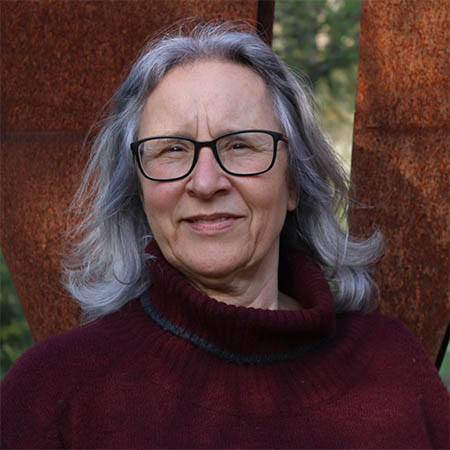
Teresa Torres de Eça is currently the coordinator the Research Centre in Arts Education and Community of the Portuguese Association of Teachers of Visual Expression and Communication (APECV) and collaborates with the CIAC Research Center in Arts and Communication /University of Algarve-Portugal. She was President of the International Society for Education Through Art – InSEA between 2014 -2019, and Chair of the Executive Forum of the World Alliance of Arts Education (WAAE) between May 2022 and May 2023. Her interests are focused on participatory action research, social engaged arts, inclusion, equality, ecofeminism, media and digital literacy, and arts education. She is co-editor of the Portuguese Journal of Art Education; and Principal Editor of the Ibero-American research journal on Education, Culture and Arts INVISIBILIDADES.
Teresa Torres de Eça: Artists in education – A landscape of connections and tensions
This reflection is about arts-based projects in or with communities, mapping a landscape throughout the questions of the Symposium. My notes about different models of programmes supporting artists in educational contexts are based on my observations in the World Alliance for Arts Education (WAAE) and International Society for Art Education ( InSEA). For the first section about programmes, I will present examples selected by members of the World Alliance for Arts Education: Big hART in Australia, Creatives in Schools in New Zealand, Arte en primera infancia in the city of Bogotá ( IDARTES), Expresarte in Peru (Ministry of Education), KACES in Korea (Korea Arts & Culture Education Service) and the Artist-In-School Scheme of the National Arts Council of Singapore. For the second section about effects and impact of the programmes, I will try to systematise expectations, objectives and desirable results in light of the UNESCO global agenda for education. I will conclude with some suggestions for strategies and participatory methodologies of working in the context of arts-based programmes for or with educational communities.

Renée Zako lives in Côte d’Ivoire, her country of origin. She holds a Master’s degree in cultural administration from the Institut National Supérieur des Arts et de l’Action Culturelle d’Abidjan. After graduating, she decided to respond to a crucial need in her country: to bring arts and culture closer to the people.
In the course of her activities, she was confronted with a real learning crisis of which the young people of her country were victims. Since then, with her association Les Associations Majuscules, she has been working to set up artistic and cultural centres, with a library in the neighbourhoods. Renée is also involved in politics to have access to decision-making positions in order to change things.
Access to quality education and the well-being and development of the population are the challenges she faces on a daily basis.